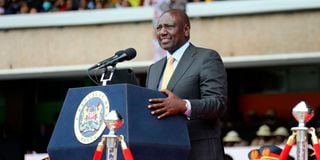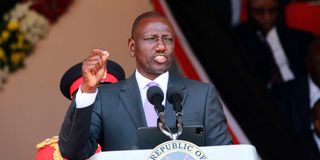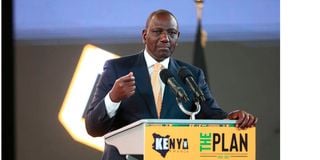The promises versus reality: President Ruto’s rough road ahead

President William Ruto addressed Kenyans after he took the oath of office at Kasarani international Stadium on September 13, 2022.
President William Ruto rode to power last year on lofty promises to create jobs for millions of unemployed youths, prioritise the needs of low-income earners and bring down the cost of living. But experts say his first budget, which takes effect on July 1, is set to make life more expensive while hitting businesses hard with high taxes.
With expected high fuel prices, a reduced take-home pay for salaried workers and an increase in sales tax for small traders, among other measures that the Kenya Kwanza administration has defended as important for their economic agenda, Kenyans will have to pay more on top of the high cost of basic commodities such as maize flour and sugar.
In the run-up to the August 9, 2022 elections, President Ruto promised to improve the living standards of the downtrodden through a bottom-up economic model. He has made further promises during the debate on the Finance Bill, 2023 to create jobs and lower the cost of living.
How the President, known for his political shrewdness, navigates the tough reality to keep his pledges will be something that could shape his first term.
Analysis of the Kenya Kwanza Manifesto vis-à-vis his first budget and accompanying tax measures shows that the new government has backtracked on some of the pre-election promises.
President Ruto's Sh3.7 trillion budget, designed to pull the country back from the brink of an economically disastrous debt default, has added a raft of tax measures that will further increase the already high cost of living.
Prof XN Iraki, an economics lecturer at the University of Nairobi, says the new tax measures will dampen the growth of industries, thereby killing any chance of more quality jobs for the many unemployed young Kenyans.

President Dr William Ruto takes the oath of office at Moi International Sports Centre, Kasarani in Nairobi, on September 13, 2022.
“Lowering the cost of living can be achieved by increasing our incomes instead of lowering prices. That would mean creating quality jobs. This requires industrialisation,” says Prof Iraki.
He adds: “Unfortunately, the current tax measures will dampen the economic growth needed to create quality jobs. Let us hope that the current tax measures are a stop-gap measure and that they will be cross-fertilised with other measures such as low-interest rates and less profligacy and rent-seeking.”
Salary deductions
Some workers will be handing over at least 40 per cent of their monthly salaries to the government in the form of a 35 per cent income tax for top earners, a 1.5 per cent housing levy and — in a separate plan, 2.7 per cent National Health Insurance Fund (NHIF) deductions — once the budget proposals are implemented.
In the run-up to last year's elections, President Ruto promised to soften the NHIF levy by changing it to a household rather than an individual.
However, he has reneged on this promise and instead increased the amount by making an individual contribution up to 2.7 per cent of gross salary. Currently, salaried Kenyans pay a maximum flat rate of Sh1,700. But the new rates mean that a worker earning Sh100,000 will now contribute Sh2,700.
“People earning Sh100,000 will contribute 1.7 per cent, which is Sh1,700. Under this structure, a couple earning Sh200,000 together will deduct Sh40,800 while a single person earning Sh100,000 will contribute Sh20,400,” reads the Kenya Kwanza manifesto.

President William Ruto acknowledges greetings from members of the public in Homa Bay town on October 2, 2022.
“The two families get the same benefits. This is clearly very unfair. We have proposed to change the contribution to family/household rather than individual as is the case with private insurance,” the manifesto adds.
Under the new law expected to come into force next week, such a couple earning a combined salary of Sh200,000 would have Sh64,800 deducted.
In his manifesto, President Ruto also identified the high cost of petroleum products as a major challenge to the country's economic stability. The manifesto states that high taxes on petroleum products are the main reason they are expensive for consumers.
“Petroleum, which is Kenya's single largest import, will remain an important fuel for several decades. Price volatility is a challenge to consumers and economic stability. It has been rightly observed that taxation is a major factor in the high cost of petroleum products,” it says.
Finance Bill 2023
The Finance Bill, 2023, which Dr Ruto is expected to sign into law any time after it was passed by MPs, has increased the Value Added Tax (VAT) on petroleum products from the current eight per cent to 16 per cent.
Once enacted, retail prices of petrol and diesel will increase by Sh12 per litre.

President William Ruto with grader operator Patrick Mbindyo during the groundbreaking ceremony for the proposed Shauri Moyo 'A' affordable housing project on January 27, 2023.
This high increase on petroleum products will drastically increase the cost of all commodities. The ripple effects will also be felt in the transport sector, with boda boda riders, who were Dr Ruto's biggest constituency during the campaigns, becoming some of the biggest casualties.
According to the Kenya National Bureau of Statistics (KNBS), food, energy and transport costs account for more than half of household budgets at 57 per cent.
Mr Ken Gichinga, chief economist at Mentoria Economics, says the country is likely to experience an economic slowdown as a result of the “punitive tax measures”.
He says most households would end up with no disposable income due to the high cost of living expected as a result of the 16 per cent VAT on petroleum products.

President William Ruto addresses wananchi during the 60th Madaraka Day national celebrations at Moi stadium in Embu on June 1, 2023. The President is pushing the affordable housing programme, saying it will create jobs and give dignity to low-income earners.
“The cost of living will go up because of the doubling of VAT on petroleum products. The trend is that the cost of transport, food and other basic commodities will go up,” says Mr Gichinga.
He adds: “I am worried about our economic growth rate because of the triple tightening; monetary tightening due to high-interest rates, fiscal tightening due to high taxes and household tightening as households will now choose not to spend due to lack of disposable income.”
In his latest promises to the country during the 60th Madaraka Day celebrations, President Ruto pledged to free Kenyans from dependence on petroleum-based transport whose prices continue to rise beyond reach. He pledged to introduce electric motorcycles by September.
“We need to free Kenyans from dependence on petroleum-based transport. That is why we are introducing an electric public transport system that will significantly reduce the cost of transport,” Dr Ruto announced.
In the manifesto, he promised to incentivise the introduction of electric mass transit systems in all cities and towns.
Chairperson of the Finance and National Planning Committee Kuria Kimani (Molo MP) told MPs that the current eight per cent is a result of subsidy, meaning taxpayers’ money has made up the difference.
This was despite the fact that National Assembly Majority Leader Kimani Ichung'wah said that Kenya’s VAT was still the lowest at 16 per cent. He cited Uganda, Tanzania and Rwanda, which he said charge 18 per cent. But fuel prices in some neighbouring countries are lower than in Kenya, even under the current eight per cent VAT.
Policy decisions
Dr Ruto's administration says policy decisions by the National Treasury, such as the removal of food and fuel subsidies that cost the country Sh15 billion a month during the regime of former President Uhuru Kenyatta, will stabilise the economy.
It has further said that the subsidies were unsustainable as the government used to borrow to fund them, with the new administration saying it inherited outstanding food and fuel subsidy bills amounting to Sh60 billion.
In the manifesto under ‘Transforming the Micro, Small and Medium Enterprise (MSME) Economy’, Dr Ruto pledged to tackle regressive taxation. According to the document, which aims to steer the new government towards economic stability, “the MSME economy contributes 85 per cent of non-agricultural employment, which today amounts to 15 million out of 18 million workers”.

President William Ruto when he launched the Kenya Kwanza manifesto at Kasarani on June 30, 2022.
It pledged to tackle regressive taxation, red tape and compliance costs so that businesses do not pay excessive taxes to create jobs for the unemployed.
The manifesto cited data from the Kenya National Bureau of Statistics (KNBS) showing that MSMEs, when properly established, contribute very significantly to the economy, generating an operating surplus per worker of over Sh50,000 per month, or Sh600,000 per year.
But by increasing VAT from the current one per cent to three per cent, the cost of doing business would rise. This could drive away start-ups that cannot pay the required taxes.
Businesses earning between Sh1 million and Sh25 million will be most affected.
The bill, which is expected to be enacted soon, seeks to lower the limit from the current Sh50 million a year to Sh25 million. Under the current law, companies with a turnover of between Sh1 million and Sh50 million pay one per cent VAT.
By lowering the current threshold, small and medium enterprises with turnover above Sh25 million will pay higher rates of 30 per cent. This could have a negative impact on some businesses, resulting in more unemployed youths.
Vihiga Senator Godfrey Osotsi says Kenya Kwanza’s tax measures make no economic sense as they will lead to a high cost of living.
“Nothing positive will come out of their economic policies and plans because these plans make no economic sense. They told us about a hybrid called the bottom-up model that will provide long-term economic solutions,” says Mr Osotsi.
“They told us that the solution to the high cost of fuel was to import fuel from Saudi Arabia on a government-to-government basis. Instead, the cost of fuel has gone up. This is another scandal in the making,” he adds.





